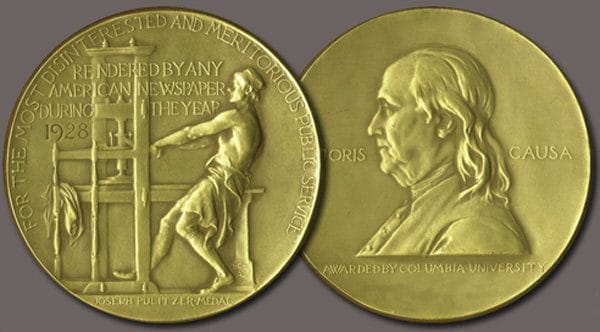New Delhi: Three Indian photojournalists were awarded the 2020 Pulitzer Prize in the field of feature photography Tuesday. Dar Yasin, Mukhtar Khan, and Channi Anand were given the prestigious award for capturing life in Kashmir after the scrapping of Article 370 and during the communication clampdown.
Named after newspaper publisher Joseph Pulitzer, the Pulitzer Prize awards newspaper, magazine and online journalism, photojournalism and literature, annually. The award is administered by Columbia University.
Aside from the three photojournalists documenting their work in Kashmir, New Delhi-based photojournalist Anushree Fadnavis has also got the award as she was part of the Reuters team that was awarded the Pulitzer in the ‘breaking news photography’ category for coverage of the Hong Kong protests.
However they aren’t the first Indians or people of Indian origin to win a Pulitzer Prize even in the same category.
Here are some Indians and people of Indian origin who have won the Pulitzer Prize in the field of journalism and literature.
Pulitzer for covering Rohingya crisis
In 2018, Adnan Abidi and Danish Siddiqui were the first Indians to win a Pulitzer for feature photography. The two photojournalists at Reuters were given the award for documenting the Rohingya refugee crisis in Myanmar and Bangladesh. The two, along with five other photojournalists at Reuters, were part of the team that won the award.
Danish Siddiqui received the award for a picture of a Rohingya refugee man pulling a child as they walked to the shore after crossing the Bangladesh-Myanmar border, while Abidi won the Pulitzer for his photograph of a man’s hand on his seven-year-old boy who was shot in the chest before crossing the border at Myanmar.
In an earlier interview, Abidi called the assignment both physically and mentally exhausting and even admitted to breaking down. He said, “One needs to mix with people as much as possible and not pose as a person benefiting from their misery.”
First Indian to win Pulitzer
In 1937, Gobind Behari Lal became the first Indian to win a Pulitzer. He won the award in the reporting category, along with four others, for “coverage of science at the tercentenary of Harvard University”. Gobind Behari Lal’s father was the Governor of the princely state of Bikaner. Lal was also part of India’s freedom struggle and even edited a newspaper that campaigned for independence. He went to the United States in 1912 as a research fellow at the University of California in Berkeley.
Lal was among the first few science writers, and he interviewed people like Albert Einstein. He had interviewed Gandhi too. Gobind Behari Lal was also awarded the Padma Bhushan in 1969.
People of Indian origin winning the Pulitzer
In 2003, Geeta Anand was part of a team of reporters at the Wall Street Journal that won the Pulitzer Prize for explanatory reporting for a series on the impact of corporate scandals in America. Thirteen years later, Sanghamitra Kalita, who was the then managing editor of Los Angeles Times, was part of the team that won the Pulitzer in the breaking news category. The Los Angeles Times won the award for reportage on the 2015 San Bernardino shooting and the terror investigation that followed.
In the non-journalism category, author Jhumpa Lahiri (who has also written Namesake and Lowland) won the Pulitzer in 2000 in the fiction category for her book Interpreter of Maladies. In 2011, Indian-American cancer physician and researcher Siddhartha Mukherjee won the prize in the general non-fiction category for his book documenting the “biography” of cancer — The Emperor of All Maladies: A Biography of Cancer. A cancer researcher, Mukherjee is also an assistant professor of medicine at Columbia University and was a Rhodes scholar who graduated from Stanford University, University of Oxford and Harvard Medical School.
In 2014, Vijay Seshadri won the Pulitzer Prize in poetry for his collection of poems ‘3 Sections’, which examined human consciousness from birth to dementia.
Also read: Pulitzer-winning US journalist charged in Brazil for exposé against justice system







I wonder people leaving comments here even under the meaning of journalism or have even seen other award winning entries.
Kya fayda 370 article removed was a good move. Why the protesters bring their kids along. Secondly where were these journalist when kashmiri pandits were murdered and assaulted. Movies which show india poor condition win Oscars and now this how stupidity.
What next Nobel prize for conversion to the church. HINDUS are being seen as prime targets . It’s time to unite politically. Educate and innovate.
SoniaG & her son RahulG did not express their condolences to our martyred soldiers’ families. Neither have the 2G’s condemned acts of terrorist violence in Kashmir.
SoniaG & RahulG are traitors and Pakistani supporters – they are wolves in sheep’s clothing. Nation should beware of these termites.
Praiseworthy. Prophets are not acknowledged in their own lands.